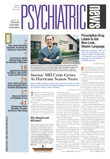As women who have made the journey to menopause know, mood swings are often part of the baggage. Exactly how susceptible women are to depression during the months and years preceding menopause, however, has been unclear, as has the role of various hormones in that depression.
A carefully designed longitudinal study has now documented not only that many women without a history of depression do get depressed during the perimenopausal period, but that changes in levels of specific hormones coincide with their getting depressed.
The study was headed by Ellen Freeman, Ph.D., a research professor in the University of Pennsylvania's Department of Obstetrics and Gynecology. Results appear in the April Archives of General Psychiatry.
Freeman and her colleagues enrolled 231 women with no history of depression in their investigation. All were premenopausal and ranged in age from 35 to 47 years. The subjects were interviewed in their homes by trained research interviewers 10 times over the following eight years about their menstrual cycle dates, reproductive history, general health status, and health behaviors.
Subjects were also assessed for current depressive symptoms with the CES-D, a self-report questionnaire, and for clinical depression with the PRIME-MD or its self-report version, the Patient Health Questionnaire. Both versions yield DSM-IV diagnoses.
Each assessment period included two visits, scheduled in the first six days of two consecutive menstrual cycles, to obtain blood samples, and these samples were measured for levels of three reproductive hormones— luteinizing hormone (LH), follicle-stimulating hormone (FSH), and estradiol.
The investigators then analyzed the information to determine whether the subjects had developed depression during the course of the study, and if so, whether the depression could be linked with the status of LH, FSH, or estradiol in their bodies at the time of depression.
Half of the subjects reported high depression scores at least once during the study, and a quarter met criteria for a depressive disorder during it. Moreover, subjects were four times more likely to experience depression symptoms during their menopausal transition than when they were premenopausal. This difference was highly significant statistically. Subjects were 2.5 times more likely to have a depressive disorder when they were perimenopausal than when they were premenopausal. This difference was also statistically significant.
Furthermore, after possibly confounding factors such as smoking, body mass index, premenstrual syndrome, health status, hot flashes, and poor sleep were considered, increased levels of LH and FSH and increased variability in LH, FSH, and estradiol were significantly linked with subjects' depressive symptoms or diagnosis of depression.
For example, when subjects were diagnosed for a depressive disorder, they were, on average, nine times more likely to have higher FSH levels and five times more likely to have higher LH levels than before they were diagnosed. And at the time of depression diagnosis, a woman was much more likely to have an increased variability in her levels of estradiol and FSH than before the diagnosis.
“Our data indicate that transition to menopause and its changing hormonal milieu are strongly associated with both new onset of high depressive symptoms and new onset of diagnosed depressive disorders in women with no history of depression,” the researchers concluded.
“This is a very important study that will benefit the area of women's mental health,” Marlene Freeman, M.D., an assistant professor of psychiatry and obstetrics and gynecology at the University of Arizona and director of the university's Women's Mental Health Program, told Psychiatric News. “These investigators carefully demonstrated that perimenopausal status and hormone variability appear to increase the risk of depression in a large segment of women. These findings should compel further research into screening and treatment for perimenopausal depression.” (Marlene Freeman, M.D., is not related to study author Ellen Freeman, M.D.)
These results, Marlene Freeman said, also “speak to the need for primary care providers, gynecologists, and other health care providers to receive appropriate education in the identification and treatment of major depression. We might expect that women who have not previously experienced mood disorders. .may feel more comfortable seeking help from a primary care doctor than a psychiatrist. In addition, considering the current controversies surrounding hormone-replacement therapy, this study's findings suggest that psychiatrists need to understand the risks and benefits of hormonal therapies for perimenopause, as well as nonhormonal options.”
The study was financed by the National Institutes of Health.
